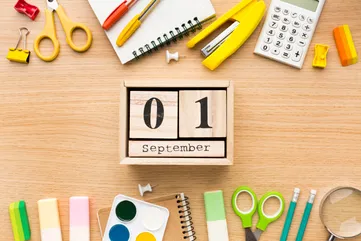Productivity
Productivity is the ability to efficiently accomplish meaningful tasks and goals while maintaining energy and wellbeing, not just doing more things faster.
You're not alone
If your teen studies for hours with little to show for it, or swings between frantic activity and complete shutdown, they're struggling with productivity like most students. Research shows the average teen is productive only 2.5 hours in an 8-hour study day. The rest is lost to distractions, inefficient methods, and mental fatigue. Learning productivity principles transforms those wasted hours.
What it looks like day to day
Student
Your teen sits at their desk for four hours "doing homework" but actually completes 45 minutes of actual work between distractions.
Parent
You see your teen exhausted from "working all day" but assignments remain incomplete and grades don't reflect the time invested.
Tiny steps to try
- 1
Energy audit
Track when your teen feels most alert. Schedule hardest tasks during peak energy, easier tasks during low energy.
- 2
Batch similar tasks
Do all math, then all writing, then all reading. Task-switching kills productivity.
- 3
Eliminate pseudo-work
Identify busy work that feels productive but doesn't advance goals. Organizing already-organized notes wastes time.
- 4
Time-box everything
Set specific time limits for tasks. Work expands to fill available time without boundaries.
- 5
Weekly reviews
Every Sunday, review what worked and what didn't. Adjust systems based on actual results.
Why teen productivity differs
Teen productivity isn't about maximizing output like adult workplace productivity. It's about learning to work effectively while brain development continues.
True productivity involves:
• Working smarter, not just harder
• Matching tasks to energy levels
• Eliminating unnecessary work
• Using systems that reduce friction
• Taking breaks to maintain focus
• Prioritizing what actually matters
Without these skills, teens either burn out from overwork or accomplish little despite long hours.
Ready to help your teen thrive?
Get personalized 1-on-1 coaching to build better habits and boost grades. Join 10,000+ families who trust Coachbit.
Frequently Asked Questions
How is productivity different from just working hard?
Hard work without strategy leads to burnout. Productivity means achieving more with less effort through smart systems. A productive student might study two focused hours and learn more than someone who studies five distracted hours. Quality of effort matters more than quantity. Teach your teen to work smarter before working harder.
My teen equates busy with productive. How do I change this?
Focus on outcomes, not activity. Ask "What did you complete?" not "How long did you work?" Celebrate efficiency: "You finished that in one hour instead of three!" Help them recognize that exhaustion isn't a badge of honor. Model taking breaks and working sustainably yourself.
Related Terms
Focus
Focus is the ability to direct and sustain attention on relevant information or tasks while filtering out distractions, requiring both concentration and mental endurance.
Organization
Organization is the ability to create and maintain systems for managing materials, information, and time in ways that support efficiency and goal achievement.
Time Management
Time management is the ability to plan, prioritize, and use time effectively to accomplish tasks and meet deadlines without constant crisis.
Related Articles

3 Tips to Help Your Child Focus on Homework
Kids struggle to focus and are easily distracted because their brains are undergoing rapid development. There are effective tools to improve concentration and focus in kids.
Read article
Finding Order in the Chaos – Setting up Calendars for Kids
Creating a calendar and daily schedule for kids can be beneficial to manage school, homework, extracurriculars and hobbies. Color-coding and time-blocking are helpful tools for kids with ADHD.
Read article
